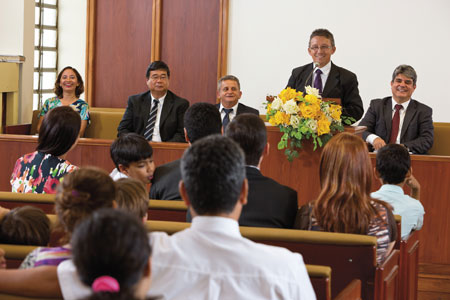Question
Gramps,
As an investigator I have attended the local church on three occasions. Two of those meetings following the sacrament was a time of testimony and one was a time of four talks by members. I never heard a “sermon” from any of the “leadership” and never was told how I could be saved. I guess some of the talks were supposed to help me “get saved” but a couple were so fast I hardly understood them and the other two were long winded “feel good” lectures about activities the local ward had done.
Timothy
Answer
Timothy,
Thank you for taking the time to investigate the teachings of The Church of Jesus Christ of Latter-day Saints and for visiting one of our local services.
Sacrament Meeting
Our sacrament meetings provide members and visitors with an opportunity to worship their Savior via singing hymns, saying prayers, partaking of the sacrament (bread and water), and through hearing others share their feelings and thoughts on topics that were provided by the local ward leadership.
The local ward leadership will assign members of the congregation to speak every Sunday. The age of members who have been invited to speak will range from 12 years old to the age of the oldest member attending the ward. There are specific Sundays throughout the year where the local leadership (i.e. bishopric or stake presidency) will speak to the congregation covering a variety to topics. The first Sunday of the month is our Fast and Testimony meeting where members have the opportunity to share their testimony. This is why you have not listened to a talk from the local leadership in your area; you haven’t visited the local church when they are assigned to speak. If you truly want to hear a talk from the local bishop, you can ask the bishop when he will speak and then attend that meeting service.
If you would like to understand more about our sacrament meetings please view this: What to Expect at a Mormon Church Service
How a Talk is Delivered
The way a member delivers their talk will depend largely on their personality, their knowledge, their age, and their familiarity with public speaking. A member that is well versed with public speaking will speak differently than a young man or young woman who just turned twelve. So, it really isn’t surprising that you listened to “feel good” talks, and talks that were spoken way too fast!
The main purpose for our sacrament meetings is to partake of the sacrament and to remind us of the covenants we have made with God. We come to worship. If we truly want to know the principles and doctrines that save us, then we have the wonderful opportunity now with the “Come Follow Me” to study these principles ourselves. We are able to discuss these principles and doctrines during the second hour of Church, either in Sunday School or Priesthood/Relief Society.
The Path to Salvation: How to be Saved
As members of the Church, we have been baptized by water and have received the Holy Ghost (baptism of fire). We have been spiritually born of God. We are currently on the path to salvation, or what we define as enduring to the end. We recognize that in our sacrament meetings we will be able to listen to principles of salvation that will help us along this path. As we listen to true principles, and act upon those principles, we will eventually become more like our Savior. We will learn of the way, the truth, and the life. The second hour of church is where we have the opportunity to study together, and to further understand how to endure to the end.
As an investigator, if you are interested in learning how to be saved, then I would invite you to take the time to visit with our missionaries. Here is a link on how you can contact them: Would you like to chat with missionaries? Our missionaries will answer questions and teach how you can get on the path of being saved.
Gramps







